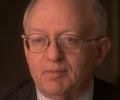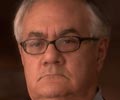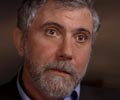Sheila Bair Chair, Federal Deposit Insurance Corporation
When [Alan] Greenspan, [Federal Reserve chairman, 1987-2006], left, Congress sort of anointed him "the Oracle" ... Do you remember when he left, that view, and was it ignoring what was to come?
I think there had been a very, very long run of very strong economic growth and prosperity, so I think it was certainly understandable that he would receive a lot of accolades. And I don't think you can take all of that away from him. There's some very good things that had happened during his tenure at the Fed.
But what we know now is that there was too much liquidity. There was too much money chasing too few assets, and so they were looking for leverage to juice up their returns, and that led to a significant deterioration in credit quality standards. I do think there was one thing that the Fed should have done, [which] was acted much earlier. … Congress did not have the momentum to pass lending standards that applied across the board, but the Fed did have the power under HOPA [Homeowners Protection Act] to do that. And that was something that Ned [Gramlich] had really advocated for, and they did not do that. ...
Going back, I think, to 2000, there had been a HUD-Treasury joint study recommending to the Fed that they use their HOPA authority to apply lending standards across the board because of the regulatory arbitrage occurring and the deterioration you could see even back then, outside the banking sector. And, you know, hindsight is always 20/20, but that was clearly one mistake that had been made. ... It could have changed things. I think it could have helped. Whether it could have avoided all of it, I don't know, but it certainly could have helped.
And you had been asking for that yourself?
We had, yes. That was Treasury's view. ... And then when I came back to the FDIC and became re-engaged in this issue again, that was definitely something that we supported.
And Chairman Bernanke did as well. He got the job done. We do have much stronger standards now. The kind of unaffordable mortgage lending that you used to see, you shouldn't be seeing anymore. It's not legal anymore. There's still an issue with Congress in terms of enforcement. Again, you have a very elaborate regulatory apparatus to enforce these standards on banks, but the enforcement mechanism for non-banks is not as robust as it could be, and I think that's something else Congress is going to be looking at.
And what do you take away from when Mr. Greenspan came back to Congress recently and made his statements? ...
I was astonished. I really was, because he's not the type of personality to do a lot of mea culpas. ... I think it's a tribute to him that he had some hindsight. There was some things that should have been done differently. ... I'm probably more regulatory than he is, particularly on the consumer side, but he's a very smart person, and I think whatever he did, I think it was truly what he believed to be in the best interest of the economy. And if there were mistakes, I think they were mistakes that a lot of people made. A lot of people didn't see this was coming. ...
Adam Davidson NPR/Planet Money
[Alan Greenspan, retiring as chairman of the Federal Reserve, is praised as the "maestro."] What didn't the people praising him know about Alan Greenspan? ...
They didn't know that Alan Greenspan had made money either free or even less than free. He had turned on a fire hose under the U.S. economy that was pushing money and investment really fast to lots and lots of places where it hadn't gone before by keeping the interest rates at this 1 percent level for such a long period of time.
They also didn't know that there was a hot debate going on at that time ... among academic economists that maybe the Fed should also be paying attention to assets, which at that time meant home prices, ... and should worry when home prices go up too fast, because the Fed is supposed to fight inflation. Alan Greenspan was absolutely [against that]. He just saw this entire debate as irrelevant. ...
Home prices for most of U.S. history had gone up at a roughly steady rate with income, and suddenly it's going up much faster than income at what now seems clearly unsustainable rates. And he was saying, "I don't care." ...
Is there a political philosophy that is the underpinning for where he's coming from?
... I think by his own description he had too much confidence in the market's ability to correct itself, particularly in this new universe. You certainly see that.
It seems that there can be too much of this binary idea: We should have regulation; we shouldn't have regulation. ... I think what we're seeing now is the whole regulatory apparatus was not prepared for this crisis, so "more or less" wasn't the right question to be asking. ...
We are brand new in this world of structured finance, and we had a regulatory apparatus, we had a Federal Reserve system, we had an entire financial oversight system built on a different model. ... I think Alan Greenspan, a lot of people were taking the logic of the old model and trying to apply it to this new world, and it didn't make sense. ...
Martin Feldstein Economist, Harvard University
What he didn't take into account was the risk of a rapid rise in asset prices. ... And it's the asset bubble, particularly in housing, but also in the stock market, that has become a major problem for us now in the ending years of this decade.
Barney Frank Chair, House Financial Services Committee (D-Mass.)
What was your assessment of [Chairman of the Federal Reserve Board] Alan Greenspan [when he was leaving office in 2006]?
I never joined in the worship. I divide my evaluation of him in two. I think he did a surprisingly good job for a conservative in recognizing that you could get unemployment down without getting inflation. … I don't join the criticism of him for keeping interest rates down. If he had raised interest rates, he would have raised unemployment. ... Under Bill Clinton, unemployment actually went down to 3.9 [percent], and Greenspan did a very good job there. It was a pragmatic and flexible one.
On the other hand, he was terribly mistaken, as he finally acknowledged, in his refusal to regulate. When they said to him, "You've got to deal with bubbles," whether it was the dot-com bubble or the housing bubble, his answer was to pose a false choice: "Oh, you want me to deflate the whole economy. I can't do that." Well, I think he was right not to deflate the whole economy, because that would have inflicted a lot of pain on marginal workers. ...
But there was a third choice, which was to regulate. He could have, for instance, during the dot-com bubble, tried by increasing margin requirements to slow down excesses in the stock market. And he certainly could have restricted the issuance of irresponsible subprime mortgages.
In fact, in 1994, there is a partisan element here. 1994 was the last time there was a Democratic majority in Congress before this current Congress. Congress passed a law telling the Federal Reserve to regulate subprime mortgages and not to allow mortgages to be granted to people who couldn't pay them back. Greenspan specifically, explicitly, said, "I won't do that; that's regulation." That's what he apologized for, and that is what he should have apologized for. If he had used the authority he was given to regulate subprime mortgage issuance, we would not be in the current crisis. And to the argument that the law was flawed, he couldn't use it, ... [Federal Reserve Chairman] Ben Bernanke, at the urging of the Democrats in Congress and after we had passed a bill in the House, used exactly the same authority from that 1994 act that Greenspan refused to use, and imposed some rules that are going to keep bad, subprime mortgages from being made. ...
Greenspan comes back up to the Hill [in October 2008] and says he was wrong. What did he say?
That he was wrong and not just in a specific but in a systemic way. That was a very important moment ... comparable I think to [Secretary of Defense under Kennedy and Johnson] Robert McNamara's confession of error with regard to the Vietnam War, because what Greenspan was saying was not simply that "I called that one wrong; this one I was off by X," or "I miscalculated." He was saying: "My fundamental approach was wrong. I thought that the market would be self-correcting. In my view, what happened was not supposed to be able to happen." And that is very important, very profound, and will have a big effect, because as we go forward for the rest of this year, we are going to be adopting regulation now, which people like Alan Greenspan used to resist. Greenspan's acknowledgement that the market is not as self-correcting as he thought is now going to be a very important piece of that argument. ...
Mark Gertler Economist, New York University
I think he prevailed over an economy from 1987 to 2005 that, most of the time, performed extremely well. I personally think he did a brilliant job managing interest rates. I think looking back, hard to do any better. The one thing he missed was regulatory adjustment -- maybe a little bit too optimistic about [how] the private market ... would behave left to its own devices.
But that's as hard as you'd be on him?
Well, I do think that's what really laid the seeds of this crisis, was the regulatory system being out of whack.
Can I also say one other thing? It wasn't just Greenspan who missed it. Some people saw it coming, but lots of people didn't. But if you think about it, in [retrospect], throughout history, the reason we've had crises is because the regulatory system has been out of whack, and financial institutions have taken advantage of that. ...
Paul Krugman The New York Times
Boy, has there ever been a greater retrospective downgrading? When he left, a lot of people, including Democratic-leaning economists, were describing him as the greatest central banker in history. And what's clear now -- there were various specific things -- Greenspan failed to see the housing bubble and so on, but most of all, he is on record as having said that we had virtually eliminated systemic risk, that the new parallel banking system, all of these complex financial arrangements had largely eliminated the problems, that basically we've got this finance thing under control. Whatever banking regulations we have actually, we really don't need anymore, because it's all securitized. And -- oh, boy.
He was probably the one person because of his position, who could have led to some prophylactic measures being taken during the bubble years. And instead he was dead set against it. No individual is to blame for this crisis. But if you were going to say who deserves the most disrepute, it would be Greenspan.
... Why did he take the stance he did on regulations? Why did he take the stance he did on derivatives and the fact that 2005 he was still saying there was no housing bubble? What was behind all that?
Greenspan is, when all is said and done, someone with a strong libertarian view of the world. His basic view is that private contracts get you to the right place and that what businessmen do with each other always works to the public good -- the invisible hand is on our side -- plus, a great faith in his own ability to clean up the mess when things do go wrong. He had, on multiple occasions, faced some kind of market crisis, responded by slashing interest rates and talking confidently about the future, and, in each case, been able to pull the economy back from the brink, and came to believe that you could always do that. He dealt with the dot-com bust. He dealt with the '87 stock market crash. He dealt with the Asian financial crisis. So he, or his successor, could always deal with whatever came.
In retrospect, his history is one of replacing each bubble with another bubble. And eventually we ran out of bubbles. But this is where he came from.






